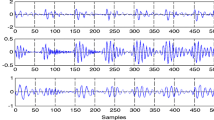Abstract
The speech signal is the result of many nonlinearly interacting processes; therefore any linear analysis has the potential risk of missing a great amount of information content. Recently the technique of Empirical Mode Decomposition (EMD) has been proposed as a new tool for analysis of non linear and non stationary data. This paper deals with this new tool, to detect usable speech in co-channel speech. We applied EMD analysis to decompose co-channel speech signal into intrinsic oscillatory modes. Detected usable speech segments are organized into speaker streams, which are applied to speaker identification system (SID). The system is evaluated on co-channel speech across various Targets to Interferer Ratios (TIR). Performance evaluation has shown that EMD performs better than the linear dyadic wavelet decomposition based methods for usable speech detection.
Access this chapter
Tax calculation will be finalised at checkout
Purchases are for personal use only
Preview
Unable to display preview. Download preview PDF.
Similar content being viewed by others
References
Reynolds, D.A.: Speaker identification and verification using Gaussian mixture speaker models. Speech Commun. 17, 91–108 (1995)
Khanwalkar, S., Smolenski, Y.: Robert E. Yantorno and S. J. Wenndt, Enhancement of speaker identification using SID usable speech. EUSIPCO (2005)
Yantorno, R.E.: Method for improving speaker identification by determining usable speech. Journal of the Acoustical Society of America 124 (2008)
Lovekin, J., Yantorno, R.E., Benincasa, S., Wenndt, S., Huggins, M.: Developing usable speech criteria for speaker identification. In: Proc. ICASSP, pp. 421–424 (2001)
Krishnamachari, K.R., Yantorno, R.E., Benincasa, D.S., Wenndt, S.J.: Spectral autocorrelation ratio as a usability measure of speech segments under cochannel conditions. In: IEEE International Symposium Intelligent Sig. Process. and Comm. Sys. (2000)
Smolenski, B.Y., Ramachandran, R.P.: Usable Speech processing: a filterless ap-proach in the presence of interference. IEEE Circuits and Systems Magazine (2011)
Kizhanatham, A., Yantorno, R.E.: Peak Difference Autocorrelation of Wavelet Trans-form Algorithm Based Usable Speech Measure. In: 7th World Multi-Conference on Systemic, Cybernetics, and Informatics (2003)
Ghezaiel, W., Ben Slimane, A., Ben Braiek, E.: Usable speech detection for speaker identification system under co-channel conditions. In: International Conference on Electrical System and Automatic Control JTEA, Tunisia (2010)
Ghezaiel, W., Ben Slimane, A., Ben Braiek, E.: Evaluation of a multi-resolution dyadic wavelet transform method for usable speech detection. World Academy of Science, Engineering and Technology Journal WASET, 829–833 (2011) pISSN 2010-376X, eISSN 2010-3778
Huang, N.E., Shen, Z., Long, S.R., et al.: The empirical mode decomposition and Hilbert spectrum for nonlinear and non-stationary time series analysis. Proc. R. Soc. Lond. A 454, 903–995 (1998)
Flandrin, P., Rilling, G., Goncalves, P.: Empirical mode decomposition as a filter bank. IEEE Signal Process. Letters 11(2), 112–114 (2004)
Ghezaiel, W., Ben Slimane, A., Ben Braiek, E.: Usable Speech Assignment for Speaker Identification under Co-Channel Situation. International Journal of Computer Applications 59(18), 7–11 (2012)
Jan, T., Wang, W.: Empirical Mode Decomposition for joint denoising and dereverberation. In: Proc. 19th European Signal Processing Conference (EUSIPCO 2011), Barcelona, Spain, August 29-September 2 (2011)
Hess, W.H.: Pitch determination of speech signal: Algorithms and devices, Springer-Verlag. Springer, Heidelberg (1983)
Author information
Authors and Affiliations
Editor information
Editors and Affiliations
Rights and permissions
Copyright information
© 2013 Springer-Verlag Berlin Heidelberg
About this paper
Cite this paper
Ghezaiel, W., Ben Slimane, A., Ben Braiek, E. (2013). Improved EMD Usable Speech Detection for Co-channel Speaker Identification. In: Drugman, T., Dutoit, T. (eds) Advances in Nonlinear Speech Processing. NOLISP 2013. Lecture Notes in Computer Science(), vol 7911. Springer, Berlin, Heidelberg. https://doi.org/10.1007/978-3-642-38847-7_24
Download citation
DOI: https://doi.org/10.1007/978-3-642-38847-7_24
Publisher Name: Springer, Berlin, Heidelberg
Print ISBN: 978-3-642-38846-0
Online ISBN: 978-3-642-38847-7
eBook Packages: Computer ScienceComputer Science (R0)




